Welcome to Beyond the Bookshelf, a community of readers and writers sharing unique perspectives on life and literature through thought-provoking essays, captivating interviews, and influential books as we explore the challenges of life's transformative journey.
Previous articles in this series:
If you are a new subscriber or missed any of the previous articles in this series you can catch up at the links below:
Dear Friends,
Our children have returned to school, and my wife has resumed working. In the house, it was just me and Lola, our dog. I had the sensation of being retired for the first time. I spent some time reading and then completed a few household tasks. Contemplating life, I sat on the back porch and enjoyed the falling rain. My schedule was free, and no boss asked me for something.
The lack of urgency in my day was refreshing. I allowed myself the freedom to think about the varied paths I could pursue in the coming months. It was a time of mental productivity, although anyone watching would have thought I sat around all day doing nothing.
I will share my future ideas with you as I flesh them out. For today, I am glad to be writing again. I hope you enjoy this installment of The Steinbeck Review covering my favorite Steinbeck novel, East of Eden.
"It has everything in it I have been able to learn about my craft or profession in all these years." - John Steinbeck - Journal of a Novel: The East of Eden Letters
John Steinbeck viewed East of Eden as his most significant achievement. It was the story he always wanted to tell. An ambitious work exploring the human condition, Steinbeck believed the book contained all he knew about good and evil. Though not a biographical account of his family, Steinbeck relied on his memories of the Salinas Valley and incorporated relatives into the work as secondary characters.
He wrote in pencil, using a blank notebook. The pages on the right contained the story. On the left, he wrote letters to Pat Covici, his friend and editor. Wearing pencils down to the nub, he went through 25 dozen of them during the year of writing. While the novel came out in 1952, it wasn’t until after his death that the letters to Covici appeared as Journal of a Novel: The East of Eden Letters.
The idea for East of Eden germinated in Steinbeck’s mind for over a decade. Following the death of his good friend, Ed Ricketts, and the end of his second marriage, Steinbeck went through one of the darkest periods of his life. He struggled to connect with his two young sons and remain a part of their life. After marrying his third wife, Elaine, he started writing this book to convey a part of himself to his boys, to whom the book is dedicated. The process of writing was cathartic, allowing him to heal after years of mental anguish.
East of Eden is a sprawling and intense novel exploring universal themes of good and evil, free will, and the struggle for identity and redemption. Set in California’s Salinas Valley and deeply rooted in the author's family history, it serves as a broader allegory for the human condition. The novel follows two interweaving storylines, depicting the fortunes of two families, the Trasks and the Hamiltons, from the Civil War to World War I.
The novel is filled with literary influences and parallels that contribute to its complex themes. The story of Cain and Abel, from the Book of Genesis, is the most prominent influence in East of Eden. It explores themes of good and evil, sibling rivalry, and inherited sin. The characters of Charles and Adam Trask in the first generation, and Cal and Aron Trask in the second, mirror the relationship between Cain and Abel. Like Cain, Charles and Cal struggle with jealousy and inadequacy towards their favored brothers, Adam and Aron. The novel explores this story further through the Hebrew word "Timshel," meaning "thou mayest," which suggests that individuals have the choice to overcome sin.
John Milton’s Paradise Lost, an epic poem exploring themes of sin, free will, and redemption, influenced Steinbeck in his writing, as evidenced by the echo of those themes. East of Eden is a modern reimagining of the fall from grace, with characters like Cathy Ames representing a Satanic figure embodying pure evil and corruption. The novel’s exploration of free will also resonates with Milton’s themes of moral choice and the possibility of redemption, even after a fall.
Steinbeck's influences may have come from antiquity and his own experience. However, the novel's major themes are timeless and relevant today. These themes include good versus evil, the complexity of human nature, the struggle for identity and meaning, and the search for love and acceptance. In this story, the characters are locked in a struggle between good and evil, which is still present in modern society. We constantly grapple with questions of morality in politics, technology, social issues, and personal choices. Like Steinbeck's characters, modern individuals also face internal conflicts about what is morally right, especially in a world with conflicting values.
Steinbeck's exploration of human complexity reflects today's understanding of psychology and behavior. People are not wholly good or evil, but rather nuanced and flawed. This mirrors modern life, which recognizes the grey areas in people's actions and motivations, especially in the context of mental health and the complexities of identity. The characters in the novel struggle with their identity, particularly when faced with parental expectations and societal pressures. This is relatable to our world, where individuals are constantly bombarded with societal standards and portrayals of success through social media. The search for purpose and authentic self-expression is a typical modern challenge.
The characters in East of Eden often feel lonely and like they don't belong. Despite technology connecting us, many people today also feel isolated and disconnected, similar to the characters in the novel. Loneliness and isolation can lead to bigger problems, as shown in the story. The novel explores guilt, forgiveness, and redemption, which are still relevant experiences for humans today. Modern life is full of situations where people seek forgiveness for past mistakes or try to start over, just like Steinbeck's characters.
Throughout this masterpiece, Steinbeck uses the theme of transformative journeys to explore the physical, spiritual, and mental changes many characters undergo. These journeys are pivotal in shaping their identities, moral understanding, and relationships with others. The characters' transformations often reflect their inner struggles with good and evil, self-discovery, and the quest for redemption.
East of Eden is a novel rich in symbolism and moral complexity. It reflects Steinbeck’s belief in the potential for human growth and redemption, even in the face of profound suffering and moral ambiguity. Through its intricate characters and interwoven plots, the novel delves deeply into the nature of good and evil, ultimately affirming the possibility of overcoming the darker aspects of human nature through choice and self-awareness. The theme of transformative journeys is central to the characters' development. Each character’s journey—whether physical, spiritual, or mental—reflects their struggle with the fundamental questions of good and evil, identity, and the possibility of redemption. Steinbeck uses these journeys to explore the complexities of human nature and the power of choice in shaping one’s destiny.
I would love to hear from you in the comments. Have you read anything by Steinbeck? What was your impression? Any favorites?
Until next month…
All opinions in this essay are my own. Any biographical or factual information was obtained through the references below:
Mad at the World: A Life of John Steinbeck by William Souder
John Steinbeck: A Biography by Jay Parini
John Steinbeck, Writer: A Biography by Jackson Benson
Steinbeck: A Life in Letters edited by Elaine Steinbeck and Robert Wallsten



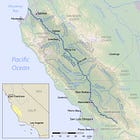
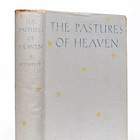
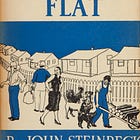
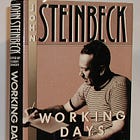

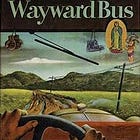





Not sure there's ever been a better book title than this one.
I loved your review of East of Eden! You really nailed the depth and complexity of Steinbeck’s work. I especially liked how you tied the novel’s themes of good and evil, free will, and redemption to modern life. It made me think more deeply about the characters' transformative journeys. Thanks for sharing such a thoughtful perspective!